Imran Name Meaning In Urdu
Imran is a well-liked Muslim name that holds great significance within Islamic culture. It has multiple meanings, but one of its most cherished interpretations is “The Name of Hazrat Musa (A.S)’s Father.” In Urdu, it is written as “حضرت موسیٰ کے والد کا نام.” Imran originates from the Arabic language and is widely used among Muslim communities.
Imran carries a sense of honor and reverence due to its association with Hazrat Musa (A.S), who is known as Prophet Moses in English. In Islamic history, he is revered as a prophet and messenger of Allah. Imran, being the father of Hazrat Musa (A.S), signifies a deep connection to this noble lineage.
Apart from its profound meaning, Imran is also considered a fortunate name with the lucky number 1 associated with it. This adds a touch of positive symbolism and charm to the name, making it even more special for those who bear it.
Overall, Imran is a significant name that embodies a rich Islamic heritage and a sense of honor. Its connection to Hazrat Musa (A.S) and its lucky connotations make it a beloved choice for Muslim parents who seek a meaningful name for their son.
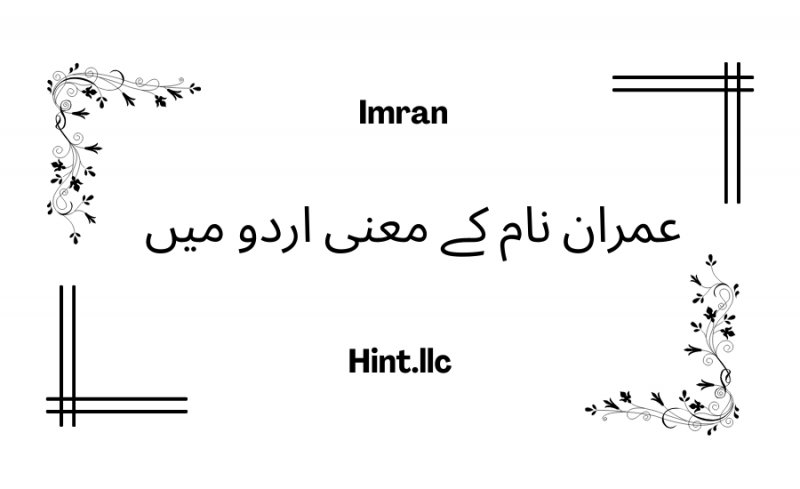
Some Quick Details About Imran Name Meaning In Urdu
| عمران | نام |
| حضرت موسیٰ کے والد کا نام | معنی |
| لڑکا | جنس |
| عربی | زبان |
| 1 | لکی نمبر |
| مسلم | مذہب |
| ہاں | مختصر نام |
| 5 حروف اور 1 لفظ | حروف کی تعداد |
| روبی | موافق پتھر |
| تانبا, لوہا | موافق دھاتیں |
Understanding Imran Name Meaning In Urdu
Urdu-speaking populations value the name “Imran”. It has cultural, historical, and linguistic significance. Imran has millennia of history. The name’s origins help us grasp its meaning. Linguistically studying “Imran” reveals its meaning and intricacies.
Imran is famous in Islamic history and literature. Notable people with this name are mentioned in the Quran. Understanding Imran’s spiritual and symbolic meaning helps us understand its cultural and religious connotations.
Imran is deeper in Urdu. Urdu-speaking populations must examine Imran’s meaning and context. This examination helps us comprehend the name’s associations, symbolism, and cultural background in Urdu.
Consider Imran’s popularity and reputation. Its frequency and popularity reveal its social prevalence. Understanding how people view Imran helps reveal the name’s social importance.
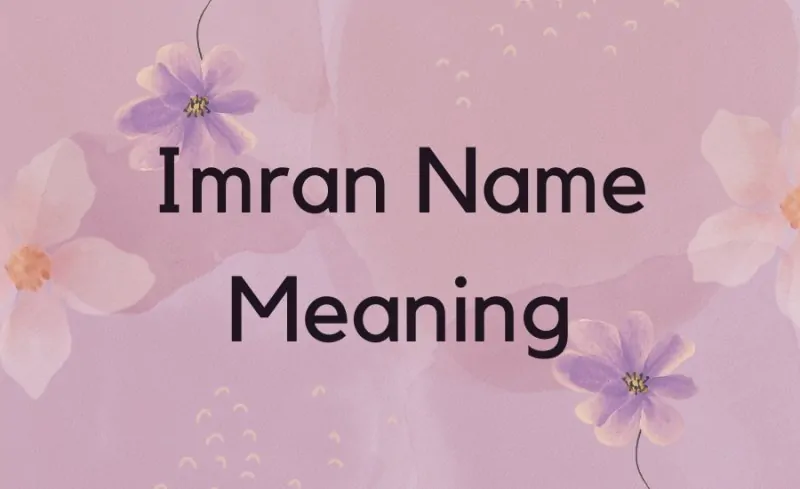
Imran transcends namesakes. It is also a surname. Explore Imran’s lineage, heritage, and family customs. Imran as a surname illuminates its cultural effects on families and communities.
Names reflect culture and art in literature and art. Imran’s prominence throughout poetry, literature, calligraphy, and visual arts shows how this name is revered and represented. Imran’s participation in different artistic fields helps us understand the name’s aesthetic and symbolic meaning.
Names change, and Imran’s significance in current culture is worth studying. Analyzing Imran’s cultural importance today reveals how this name has changed. It helps us grasp Imran’s meaning’s evolution and relevance now.
Imran Name Meaning In Urdu
عمران ایک مسلمان نام ہے اور یہ لڑکوں کو دیا جاتا ہے۔ اس کے دو اسلامی معانی ہیں۔ عربی زبان میں یہ نام “حضرت موسیٰ کے والد کا نام” کا مطلب رکھتا ہے۔ عمران ایک عربی نام ہے اور اس کا خوش قسمتی نمبر 1 ہے۔ عمران کے لئے منگل اور جمعرات مثبت دن ہیں۔ اس نام کے پسندیدہ رنگ سرخ اور بنفشی ہیں۔
Imran in Islamic Context
Religious literature uses the name “Imran” in Islam. The following subheadings will expand on this topic:
A. Imran in the Quran
Imran finds mention in the Quran, the holy book of Islam. The name is associated with the story of the mother of Maryam (Mary), who was named “Imran’s wife” in the Quran. The mention of Imran in this context highlights the lineage and family connection to Maryam, who holds immense reverence in Islamic tradition. The Quranic references provide a basis for understanding the historical and spiritual significance of the name within Islamic teachings.
B. Notable Figures with the Name Imran
Throughout Islamic history, there have been notable figures who carried the name, Imran. These individuals left their mark in various domains, contributing to scholarship, leadership, and other fields. Exploring the lives and accomplishments of these individuals helps us understand the role and impact of people named Imran in Islamic civilization. Their stories contribute to the rich tapestry of Islamic history and highlight the diverse paths and contributions associated with the name Imran.
C. Religious Significance of Imran
Imran carries religious significance within Islamic culture and belief. The name holds spiritual connotations, symbolizing devotion, righteousness, and faith. It is often associated with individuals who embody these qualities and serve as role models within their communities. The religious significance of Imran extends beyond the name itself, encompassing the virtues and values it represents. Understanding the religious connotations associated with Imran provides insight into its deeper spiritual meaning and the virtues it represents within Islamic traditions.
Popular Usage and Perception
The popularity and perception of Imran have grown. Its social relevance can be gained by studying its use and perception.
Imran is prominent among Urdu-speaking areas. It’s a popular name among parents. Its popularity shows its attraction to people seeking meaningful and culturally significant names.
Cultural, social, and personal contexts affect Imran’s image. Some consider it a noble name that evokes leadership, intelligence, and charisma. Others see it as a name that represents ancestry and identity. Different people and societies view Imran differently.
Famous Imrans may also affect how people view him. Famous Imrans—athletes, politicians, and artists—influence society’s view of the name. Their achievements and public image can inspire adoration and respect, boosting the name’s favorable reputation.
Names change over time and between cultures. Many people associate Imran with positivity, however, personal preferences can also affect how the name is viewed. Imran’s popularity and cultural significance in Urdu-speaking communities demonstrate its lasting appeal.
Various Spellings of the Name Imran
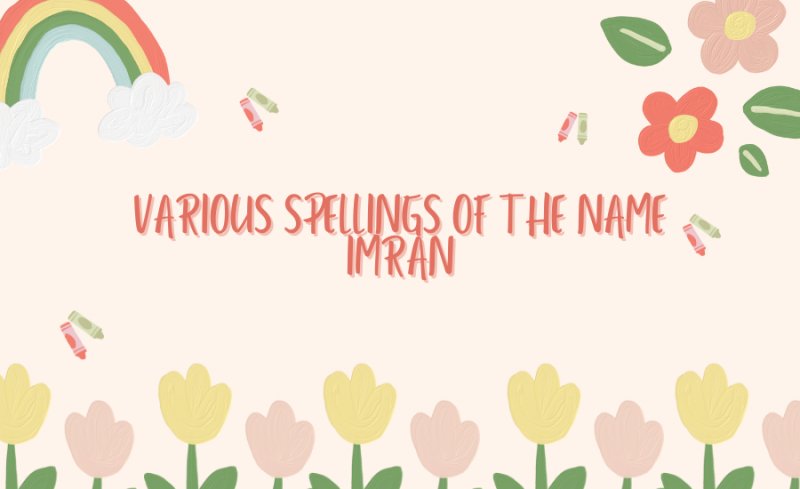
The name Imran can be found spelled in different ways in various languages and cultures. Here are some notable examples:
- In Turkish, you may come across variations such as Emraan, Amram, and Emrah.
- In the Bible, the name appears as Amram.
- In Arabic, the name is written as عمران.
- In Persian, the name is spelled as Emran.
These different spellings showcase the linguistic influences and cultural adaptations of the name Imran. Although the pronunciation and written form may vary, the fundamental meaning and importance of the name remain consistent across these diverse languages and contexts.
Imran is a Family Name
Imran is rarely used as a surname, but its potential connotations are worth considering. Subheadings will help us explore this topic:
A. Imran as a Surname
Although Imran is predominantly known as a given name, there are instances where it is adopted as a surname. In such cases, the surname Imran becomes a distinctive marker for a particular family or lineage. This usage highlights the significance and attachment to the name within a specific family context, reflecting a sense of identity and heritage.
B. Family Lineage and Heritage
For those families who have adopted Imran as their surname, it becomes an integral part of their family lineage and heritage. The surname serves as a link to their ancestors, indicating a shared heritage and ancestral roots. Exploring the family lineage associated with the surname Imran can provide insights into the historical, cultural, and geographic origins of the family, offering a deeper understanding of their heritage and connection to specific regions or communities.
C. Family Traditions and Cultural Practices
In families where Imran is used as a surname, there may be unique family traditions and cultural practices associated with the name. These traditions can vary depending on the specific family’s background, cultural customs, and regional influences. Family members may have specific ways of honoring their surname through customs, rituals, or celebrations, which further strengthen their sense of identity and belonging.
It is important to note that while Imran is not widely recognized as a family name or surname, these subheadings explore the potential implications and considerations associated with using Imran in such a manner. The significance of Imran as a family name may vary depending on individual family dynamics, cultural practices, and personal choices.
Name Combination With Imran
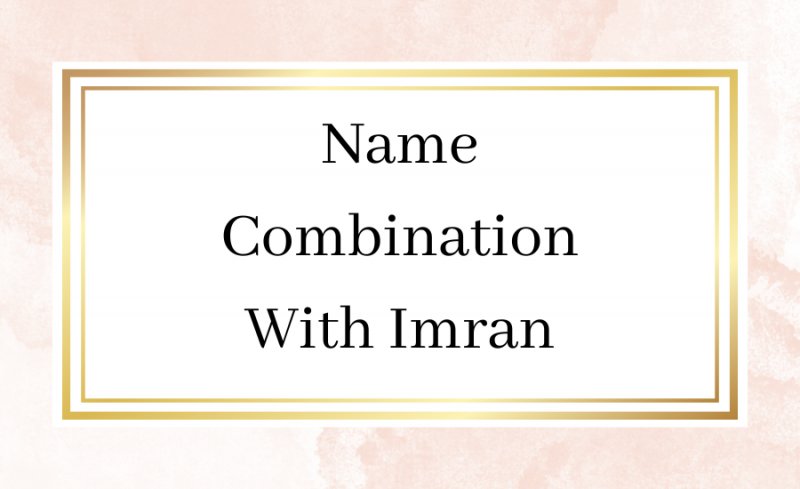
| In English | In Urdu |
|---|---|
| Imran Muhammad | عمران محمد |
| Imran Ahmad | عمران احمد |
| Imran Ali | عمران علی |
| Imran Hamza | عمران حمزہ |
| Imran Ibrahim | عمران ابراہیم |
| Abdul Imran | عبدالعمران |
| Imran Yusuf | عمران یوسف |
| Imran Rashid | عمران راشد |
| Imran Hassan | عمران حسن |
| Imran Mustafa | عمران مصطفٰی |
History’s Most Notable Persons With The Name Imran
Imran’s literature and art are culturally significant. Imran’s name appears in poetry, prose, and other writings. Poets and writers have utilized Imran to inspire imagery, emotions, and themes. Imran symbolizes culture, identity, and philosophy through words.
Art, calligraphy, and other creative manifestations honor Imran. Artists reflect Imran’s beauty, profundity, and cultural relevance. Paintings, sculptures, and other creative forms interpret and visualize Imran’s name.
In literature and art, Imran’s name is attractive and symbolic. Depending on the context, it might symbolize resilience, knowledge, or spiritual dedication. In literature and art, Imran’s name connects language, culture, and creativity.
Imran’s existence in literature and art helps us understand the name’s cultural significance and how it has inspired artists and authors. Imran’s artistic portrayal shows how a name may inspire, beautify, and contemplate.
History’s Most Notable Persons With The Name Imran
When considering well-known historical figures named Imran, it’s important to note that Imran is not widely recognized as a historical name in Western history. However, within Islamic history and culture, Imran is a common name.
The Quran calls Imran the father of Maryam (Mary), the mother of Jesus (Isa). Imran is highly respected as a devout and virtuous individual in Islamic history. However, it’s crucial to understand that Imran is not a personal name but rather a symbol of Maryam’s lineage.
As a result, there are no prominent historical figures known by the name Imran in the context of Western history. Nevertheless, the name holds significant religious and cultural significance within the Islamic tradition.
Similar Names to Imran
| Ammar-عمّار | Irfan-عرفان | Imtiaz – عمتیاز |
| Imad – عماد | Irshad – ارشاد | Izhaan – اذہان |
Popular contemporary figures with name Imran
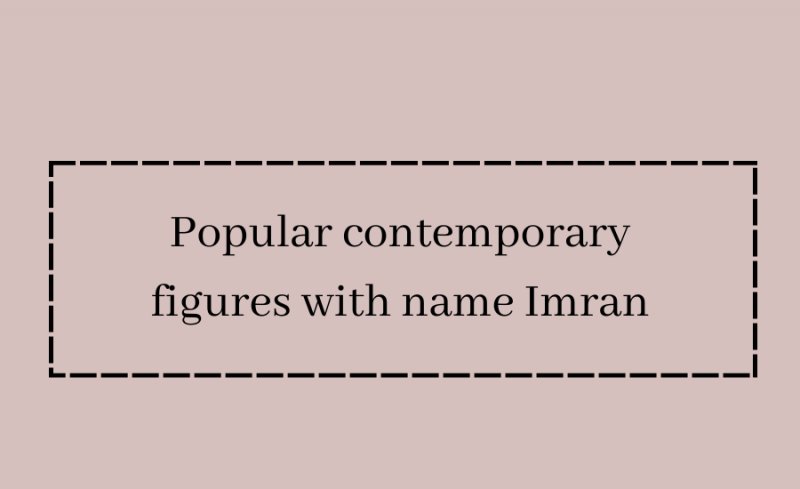
Imran Khan: Pakistan’s Prime Minister and former cricketer, Imran Khan is famous. He spearheaded Pakistan’s 1992 Cricket World Cup win. In 1996, Imran Khan launched Pakistan Tehreek-e-Insaf (PTI). Pakistan’s prime minister since 2018.
Imran Abbas: Imran Abbas is a famous Pakistani model and actor. He is most known for his roles in “Khuda Aur Muhabbat” and “Alvida.” Imran Abbas has starred in Bollywood films like “Creature 3D” and “Ae Dil Hai Mushkil.”
Imran Tahir: South Africa’s Imran Tahir plays cricket. He is known for his leg-spin bowling in South African ODIs and T20Is. Tahir celebrates his bowling successes.
Imran Name Meaning in Contemporary Society
Imran is still important today. Let’s dig deeper:
Imran in Modern-Day Naming Trends
Modern naming trends favor Imran. Imran is typically chosen by parents to commemorate family traditions, cultural background, or identity. The name evokes Urdu culture, language, and ideals. Imran’s popularity shows its eternal appeal and cultural relevance despite changing naming trends.
Implications of Imran’s Cultural Significance
Modern culture values Imran. It represents Urdu-speaking cultures and traditions. Imrans are proud of their origin and name. Imran creates a sense of community and kinship among those with the name. Imran’s cultural relevance emphasizes cultural diversity and language, customs, and traditions.
The Evolution of Imran’s Meaning Over Time
Imran’s meaning has changed like every name. The name has historical and theological importance, but people’s interpretations vary. As society evolves, Imran’s meaning may change to reflect modern values. Language and society are ever-changing, and Imran’s meaning continues to resonate with people.
These subheadings offer ideas about Imran’s meaning in modern culture, but individual perspectives and experiences may vary. Personal, cultural, and societal aspects shape Imran’s cultural relevance and meaning.
Learn more about the name Imran
- The name Imran carries a profound significance as it is associated with the meaning “The name of Hazrat Musa (A.S)’s father.”
- This name holds a special place within the Muslim religion and is highly regarded.
- Imran originates from the Arabic language, which adds to its cultural and linguistic heritage.
- It is a name that resonates with Muslim communities worldwide.
People Also Ask (FAQs)
Here Are Some (FAQs) About Imran Name:
Q: What does the name “Imran” mean?
A: “Imran” is Arabic and Urdu. Its meaning is “prosperity,” “long life,” or “exalted.” A name’s meaning can vary by culture and person.
Q: Is “Imran” a popular name?
A: “Imran” is popular in Urdu-speaking and Islamic communities. It is prominent in South Asian and other naming customs.
Q: Does the name “Imran” have religious significance?
Yes, “Imran” is religious in Islam. In the Quran, it refers to Maryam’s mother. This religious connection gives the name spiritual and metaphorical meaning.
Q: Are there notable figures named Imran?
A: Imrans have achieved success in several spheres. Politicians, writers, athletes, and others are included. Their accomplishments boost brand awareness.
Q: What is the cultural significance of the name “Imran”?
A: Urdu-speaking communities link “Imran” with their culture. It symbolizes identity, tradition, and pride, promoting belonging and cultural values.
Q: How has the meaning of the name “Imran” evolved over time?
A: “Imran” has changed meaning and interpretation like every name. The name has historical and religious importance, but personal interpretations differ. As language and culture evolve, “Imran” may absorb modern values and ideals.
Q: Is “Imran” used as a family name or surname?
A: “Imran” can be a surname. The family’s heritage and identity are carried by the mark.
Q: How does the name “Imran” contribute to cultural diversity?
A: Urdu-speaking groups give “Imran” cultural diversity. It promotes cultural understanding by bridging languages, customs, and traditions.
Q: Can “Imran” have a personal meaning?
A: Based on personal experiences, ideas, and values, “Imran” can be personalized. Individuals may give the term its own meaning, expressing their distinct thoughts and connections with it.
Conclusion
Today, “Imran” has cultural and historical relevance. Modern Urdu-speaking naming trends demonstrate its ongoing appeal and relevance. “Imran” symbolizes identity, tradition, and pride. Islamic culture gives it spiritual and symbolic meaning. “Imran” is connected with leadership, intelligence, and honesty. Famous people with the name have raised their social standing. “Imran” has transcended its literal definition to inspire and symbolize cultural richness via literature, painting, and other creative manifestations. “Imran” has changed with cultural and social settings. Personal experiences and ideas influence how people understand things. However, the name connects individuals, promotes cultural variety, and preserves linguistic and traditional legacy. “Imran” is still used by people and families looking for a meaningful and culturally significant name. Understanding its historical, religious, and cultural significance helps us appreciate the name’s lasting worth and function in shaping personal identities and cultural relationships. “Imran” is more than a name. It weaves history, tradition, and personal significance into contemporary culture and leaves a lasting legacy.
Stay in touch to get more updates & alerts on Hint! Thank you







